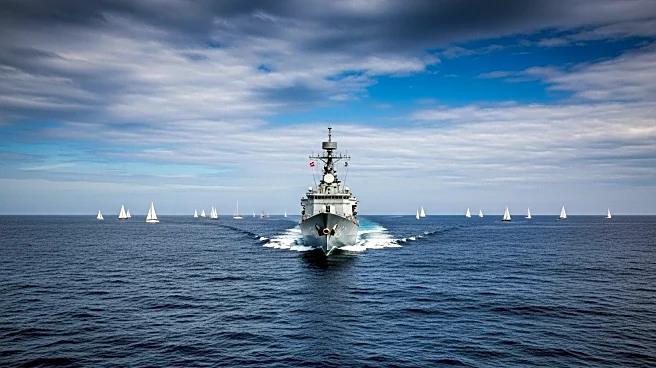What is the story about?
What's Happening?
The Israeli navy intercepted a flotilla of vessels attempting to deliver humanitarian aid to Gaza. The flotilla, known as the Global Sumud Flotilla, consisted of nearly 50 boats and 500 activists, including Greta Thunberg and Nelson Mandela’s grandson, Mandla Mandela. The interception occurred approximately 70 nautical miles from Gaza's coast. Israeli authorities confirmed that the activists were safe and being transferred to Israel. The flotilla aimed to break the Israeli blockade and deliver aid to Palestinians. Despite warnings from Israel and other governments, the flotilla proceeded, broadcasting their journey live. The Israeli Foreign Ministry stated that the operation would take 2-3 hours, with the boats being towed to Ashdod and activists deported subsequently.
Why It's Important?
The interception of the flotilla highlights ongoing tensions surrounding the Israeli blockade of Gaza, which has been in place for 18 years. The blockade is a contentious issue, with Israel citing security concerns and activists arguing for humanitarian access. The involvement of high-profile figures like Greta Thunberg draws international attention to the situation, potentially influencing public opinion and diplomatic relations. The event underscores the complex dynamics of international law, humanitarian aid, and geopolitical conflicts in the region. It also raises questions about the balance between security measures and humanitarian needs.
What's Next?
The activists are expected to be deported in the coming days, and the boats will be towed to Israel's port of Ashdod. Turkey has condemned the interception, calling it an act of terrorism, and is seeking the release of its citizens. The situation may prompt further diplomatic discussions and actions from countries involved, including Spain and Italy, which have shown support for the flotilla. The incident may also lead to increased scrutiny of Israel's blockade policies and their impact on Gaza's humanitarian situation.
Beyond the Headlines
The interception of the flotilla raises broader questions about the legality and ethics of maritime blockades in conflict zones. International law experts debate the justification of such blockades and the rights of civilian groups to deliver humanitarian aid. The event may influence future legal interpretations and policies regarding humanitarian missions in conflict areas. Additionally, the involvement of activists from various countries highlights the global nature of advocacy for Palestinian rights and the potential for international solidarity movements to impact regional conflicts.

















